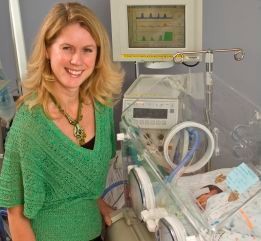Liggins Institute
Dr Kitty Bach
Current position
Neonatologist, National Women’s Health, Auckland Hospital
Liggins Institute postgraduate programme
PhD, awarded 2011
Research topic
Novel concepts in ventilator-induced lung injury in preterm babies
Primary supervisor
Paediatrician Kitty Bach is one of a growing number of qualified medical specialists who have taken time out from the clinic to become involved in research at the Liggins Institute.
Kitty came to Auckland from the Netherlands for a one year clinical fellowship based in the neonatal intensive care unit (NICU) at Auckland Hospital’s National Women’s Health but stayed on working in the Unit before beginning her PhD research at the Liggins Institute.
She became a member of the Institute’s LiFePATH (Liggins Fetal, Perinatal and Maternal Translational Research for Lifelong Health) research team which has a focus on improving clinical care through experimental research.
Recent developments in technologies and understanding have improved the chances of survival for increasingly younger and smaller babies. However there are down-sides to some technologies.
“Almost all babies born before 28 weeks’ gestation need artificial ventilation to breathe, but we know that this causes lung injury and chronic disease,” says Kitty.
Kitty’s particular interest is in the shear stress injury caused when the pressurised ventilator gases create turbulence at the junctions of the babies’ tiny airways. The ventilators require a certain gas flow to pressurise the system and these are based on standards that have been adopted in neonatal units throughout the world. She says the Nursery staff noticed that the babies seemed more comfortable if the machines were operated at lower flow rates, but without evidence that the procedures were still effective and did in fact reduce lung damage, it would not be ethical to make any changes.
The Liggins team has developed a model intensive care unit for newborn lambs at the Institute’s research farm outside Rotorua, where they are able to develop and trial new and modified procedures for neonatal clinical care. Assisted by NICU staff from Auckland Hospital, Kitty used clinical equipment to ventilate and care for preterm lambs and collect data to show whether lower gas flow rates cause less lung damage.
The study showed that ventilation was still effective at lower gas flow rates and laboratory examination of lung tissues revealed a marked reduction in physical damage and in the activity of genes known to be early indicators of lung cell damage, compared with samples from animals ventilated at higher flow rates.
Kitty now has the opportunity to see her research translated into evidence-based improvements in clinical care. The FLORA (Flow at Lower Rates) study is a multicentre pilot study to determine the effectiveness of lower gas flow rates in reducing the incidence and severity of lung damage and disease in preterm babies, born before 28 weeks’ gestation or with a birth weight of less than 1,000 g, who require ventilation in the first week of life.
If feasible, data generated by this pilot study will be used to develop a larger multicentre study powered to detect a difference in lung injury or the risk of bronchopulmonary dysplasia.
Kitty has been widely recognised for her research. She won the New Investigator’s Prize when she presented her preliminary results at a meeting of the Paediatric Society of Australia and New Zealand and received a rare invitation to make an oral presentation at the prestigious Paediatric Society meeting in Baltimore.
She was supported through her PhD by a Clinical Research Training Fellowship from the Health Research Council of New Zealand, with research funding provided by Auckland Hospital and the Auckland Medical Research Foundation. Draeger Medical Infant Care and Fisher and Paykel Healthcare provided clinical equipment for the study.
Read more about the FLORA study
Visit the LiFePATH research pages
-
SUPPORTING US
-
SUPPORTING US








